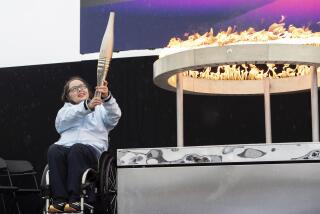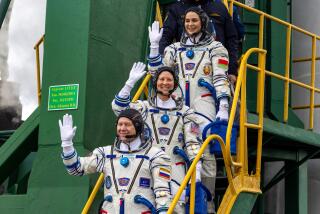Cosmonauts take Olympic torch for a walk in space
MOSCOW — The Russian relay ahead of the Olympic Games reached its peak Saturday, both figuratively and literally, as two Russian cosmonauts took the Olympic torch on a walk outside the International Space Station about 186 miles above Earth.
The torch, tied to the station by two ropes for security, was passed from one cosmonaut to another for an hour as they changed positions in search of a better vantage point for a photo op. Their seven colleagues — three Americans, two Russians, an Italian and a Japanese — watched from the station, giving them advice and directions by radio.
“You can’t afford such a rarity to be lost,” Russian cosmonaut Mikhail Korniyenko, who has spent 176 days in space, said from the studio of Rossiya-24, which broadcast the event live. “You can’t hold unfixed objects, you can’t be unfixed yourself. If you walk away [from the ship] no one will be able to help you.”
The torch, which is shaped like a curved sword, was never lighted during the walk, or, for safety reasons, in the space station, Korniyenko said.
The Russian Olympic flame relay for the Sochi Games in February involves about 14,000 bearers carrying the torch on foot and by car, train, plane, submarine, horse and deer-pulled cart over 40,400 miles across Russia and beyond. The torch already has been taken to the North Pole and is expected to be carried to the top of the 18,510-foot-high Mt. Elbrus peak in the North Caucasus and down into the 5,387-foot-deep Baikal Lake in Eastern Siberia.
Though Olympic torches have orbited in space before, the spacewalk was a first.
“The delivery of the Olympic torch into open space is an unprecedented event in the history of both the Olympic movement and world cosmonautics,” Vladimir Popovkin, chief of the Russian space agency Roskosmos, said in a statement published on the agency’s website. “Its delivery to orbit and its appearance in outer space will become a new page in space chronicles.”
The torch was taken into orbit Thursday by three astronauts in a Russian Soyuz rocket and will return to Earth on Monday. It will be used to ignite the Olympic flame at the start of the Winter Games in Sochi, organizers said.
A military industrial plant in Krasnoyarsk famous for producing Russian Proton space rockets manufactured more than 14,000 torches so that each torch carrier could keep his or hers as a souvenir.
The cost of the operation has not been disclosed, but experts calculated that the Olympic Games in Sochi will be the most expensive in history, with its construction budget already exceeding $52 billion. The cost and allegations of corruption tied to the project have drawn fire from Kremlin critics, including former First Deputy Prime Minister Boris Nemtsov, who in an interview last month with The Times called the Games “the scam of a century.”
[For the record, 3:05 p.m. on Nov. 10: An early version of this post incorrectly stated that the inteview with Nemtsov was this month.]
Taking an unlighted torch on a spacewalk underscores those problems, said Andrei Piontkovsky, a prominent Russian political expert.
“The original Olympic fire already went out last month as it was taken out of the Kremlin gates and had to be fired back up with a lighter of a security agent,” said Piontkovsky, a senior researcher with the Russian Academy of Sciences’ Institute for Systems Analysis. “A plant in Krasnoyarsk that has been producing Proton rockets that keep falling has now produced thousands of torches that keep going out, just a symbolic proof that the Olympic Games in Sochi will be an economic, political and sports fiasco for Russia.”
But a businessman and former cosmonaut said the torch’s hour outside the space station was just a bit of amusement that showed how advanced and successful Russia has become.
“Why don’t we do it, if we can afford this symbolism?” Magomed Tolboyev said in an interview with The Times. “And for the space crew it will be some relaxing fun outside their daily chores to be remembered by themselves and humanity for years to come.”
ALSO:
Outspoken mayor from Mexico’s Michoacan state found dead
New Pentagon report paints mixed picture of Afghanistan security
Toronto Mayor Rob Ford loses radio show, calls mount for his exit
More to Read
Sign up for Essential California
The most important California stories and recommendations in your inbox every morning.
You may occasionally receive promotional content from the Los Angeles Times.










